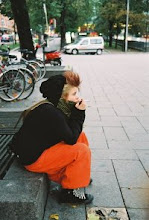Wednesday, July 16, 2008
Stories from the army
Missing mother...
Food = Gasoline
Escape!
A little something about my grandfather and happenings in his life.
When he was young, my grandfather went to school at Päärdu manor and after reaching the age of 16 and having finished 8 grades he went on to become a furniture-maker at Tallinn Industrial School, because at that time the only other option was to become a collective farmer, especially because his father was herd brigade leader at the local collective. Noone wanted to become a collective farmer, so he tried to avoid by all means. After finishing his studies they wanted to recruit him straight away in May, so they could hold him there for the whole summer without official record, so he never signed the document stating he had received his recruitment papers and went back to Vigala to his father to spend the summer there and eventually left on 9th September. This was in 1952.






